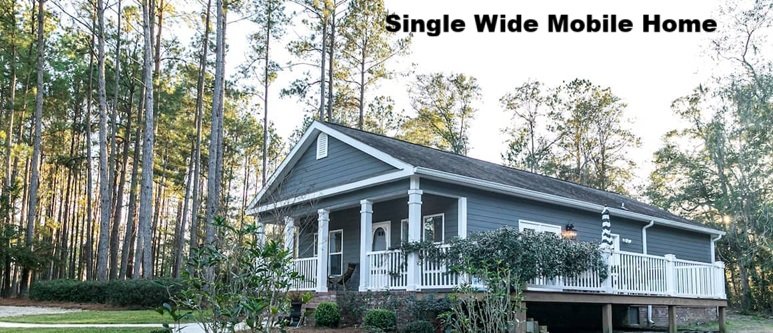Mobile houses have ended up one of the most popular housing picks for people and families seeking out lower-priced, green, and customizable living spaces. Among the different types available, the single huge cell domestic stands proud as a realistic alternative for plenty. Whether you’re planning to downsize, buy your first home, or spend money on low-cost housing, knowing the capabilities, blessings, and concerns of an unmarried wide cell home will let you make a knowledgeable choice.
What Is a Single Wide Mobile Home?
A single wide cell home is a factory-built synthetic domestic designed to be transported as a single unit. Unlike double huge or modular homes, it’s far constructed on a unmarried chassis and is typically narrower in width, making it simpler and much less expensive to move and install.
These houses are constructed in compliance with the U.S. Department of Housing and Urban Development (HUD) code, ensuring safety, sturdiness, and energy performance.
Typical Dimensions
One of the most distinguishing features of a single extensive cell is its size. While the length can range, the width commonly falls within positive ranges.
- Width: 14–18 ft
- Length: 40–eighty toes
- Square Footage: Approximately 600 to at least 300 square toes
This makes them appropriate for small families, couples, or individuals who need a balance of affordability and luxury.
Design and Layout
Despite their compact length, single-wide mobile homes are intelligently designed to maximize space. Common layouts consist of:
- Two to 3 bedrooms
- One to two bathrooms
- An open-concept kitchen and dwelling room
- Built-in garage and closets
Many current models also come with upgraded finishes, strength-efficient home equipment, and customizable ground plans, permitting homeowners to personalize the space to match their lifestyle.
Benefits of a Single Wide Mobile Home
1. Affordability
The biggest gain is cost. Single huge houses are much less high-priced than traditional stick-built homes and even double-wides. They offer a practical direction to homeownership without a huge monetary burden.
2. Energy Efficiency
Modern, extensive mobile homes are constructed with advanced insulation, double-pane windows, and power-saving appliances, which help lessen utility payments.
3. Mobility
Since those homes are transported as an unmarried unit, relocation is less complicated as compared to larger manufactured houses. This makes them appealing to shoppers who may additionally need flexibility in the future.
4. Low Maintenance
Their smaller size makes upkeep and cleaning a good deal easier, perfect for individuals or small families who choose minimum upkeep obligations.
five. Customization Options
From flooring and cabinetry to outside finishes and porch additions, many single-wide cell houses allow for sizable customization.
Cost of a Single Wide Mobile Home
The fee for a single extensive mobile home can range based on length, functions, and vicinity. On average:
- Basic Models: $40 000 – $60,000
- Mid-Range Models: $60,000 – $ninety,000
- High-End Models: $90,000 and above
Additional charges might also encompass land purchase, installation, utilities, and placement instruction.
Financing Options
Buying a single-wide cell domestic may contain financing through:
- Personal property loans (chattel loans)
- FHA loans
- VA loans (for veterans)
- Conventional manufactured home loans
Financing phrases frequently depend upon whether or not the house is positioned on owned land or leased property.
Single Wide vs. Double Wide Mobile Homes
| Feature | Single Wide Mobile Home | Double Wide Mobile Home |
|---|---|---|
| Width | 14–18 feet | 20–32 feet |
| Transportation | One unit | Two sections joined on-site |
| Size Range | 600–1,300 sq. ft. | 1,200–2,500+ sq. ft. |
| Cost | More affordable | More expensive |
| Layout | Narrow, linear design | Spacious, house-like layout |
If you are looking for affordability and performance, an unmarried huge is good. If you want more space and a residential sense, a double extensive may be better.
Placement Options
Single huge mobile houses can be placed in numerous settings:
- Private Land: Buying or leasing land gives owners extra freedom.
- Mobile Home Parks: Communities often offer facilities like pools, playgrounds, and security.
- Rural Areas: A cost-effective housing answer for human beings searching for peace.
Are Single-Wide Mobile Homes a Good Investment?
For many, sure. These homes are low-cost, short to install, and may be respected in fee if well-maintained and placed on owned land. They are particularly useful for first-time customers, retirees looking to downsize, or investors searching for apartment properties.
However, resale price can be decrease than traditional homes, so it’s important not to forget long-term dreams.
Tips Before Buying
- Check Local Zoning Laws – Ensure cell houses are authorised at the assets.
- Inspect Quality and Build – Look for HUD certification, insulation rankings, and materials used.
- Consider Land Costs – Decide whether you may lease lots in a community or purchase land.
- Plan for Utilities – Factor in water, sewer, and power hookups.
- Compare Financing – Shop for the best loan costs and phrases.
Final Thoughts
An unmarried huge cell home offers an affordable, green, and flexible housing alternative for folks who prioritize simplicity and value financial savings. With present-day designs, energy-efficient features, and customization alternatives, they provide consolation without the financial stress of traditional homeownership. Whether you’re beginning a new bankruptcy, downsizing, or investing in belongings, single extensive cellular homes offer a smart and sensible answer.

1 thought on “Single Wide Mobile Home: Everything You Need to Know”